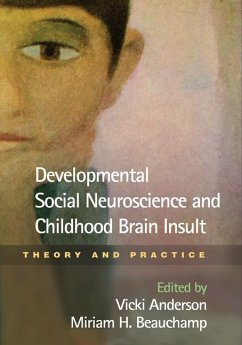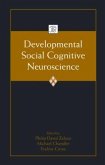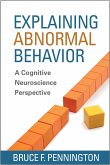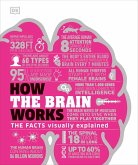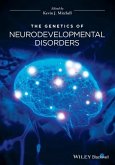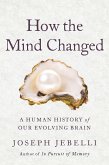Developmental Social Neuroscience and Childhood Brain Insult
Theory and Practice
Herausgeber: Anderson, Vicki; Beauchamp, Miriam H
Developmental Social Neuroscience and Childhood Brain Insult
Theory and Practice
Herausgeber: Anderson, Vicki; Beauchamp, Miriam H
- Gebundenes Buch
- Merkliste
- Auf die Merkliste
- Bewerten Bewerten
- Teilen
- Produkt teilen
- Produkterinnerung
- Produkterinnerung
Synthesizing cutting-edge knowledge from multiple disciplines, this book explores the impact of acquired brain injury and developmental disabilities on children's emerging social skills.
Andere Kunden interessierten sich auch für
![Developmental Social Cognitive Neuroscience Developmental Social Cognitive Neuroscience]() Developmental Social Cognitive Neuroscience198,99 €
Developmental Social Cognitive Neuroscience198,99 €![Explaining Abnormal Behavior Explaining Abnormal Behavior]() Bruce F PenningtonExplaining Abnormal Behavior63,99 €
Bruce F PenningtonExplaining Abnormal Behavior63,99 €![Central Neural States Relating Sex and Pain Central Neural States Relating Sex and Pain]() Richard J BodnarCentral Neural States Relating Sex and Pain89,99 €
Richard J BodnarCentral Neural States Relating Sex and Pain89,99 €![The Scientific American Healthy Aging Brain The Scientific American Healthy Aging Brain]() Judith HorstmanThe Scientific American Healthy Aging Brain23,99 €
Judith HorstmanThe Scientific American Healthy Aging Brain23,99 €![How the Brain Works How the Brain Works]() DkHow the Brain Works24,99 €
DkHow the Brain Works24,99 €![The Genetics of Neurodevelopmental Disorders The Genetics of Neurodevelopmental Disorders]() The Genetics of Neurodevelopmental Disorders168,99 €
The Genetics of Neurodevelopmental Disorders168,99 €![How the Mind Changed How the Mind Changed]() Joseph JebelliHow the Mind Changed24,99 €
Joseph JebelliHow the Mind Changed24,99 €-
-
-
Synthesizing cutting-edge knowledge from multiple disciplines, this book explores the impact of acquired brain injury and developmental disabilities on children's emerging social skills.
Hinweis: Dieser Artikel kann nur an eine deutsche Lieferadresse ausgeliefert werden.
Hinweis: Dieser Artikel kann nur an eine deutsche Lieferadresse ausgeliefert werden.
Produktdetails
- Produktdetails
- Verlag: Guilford Publications
- Seitenzahl: 398
- Erscheinungstermin: 20. Juni 2012
- Englisch
- Abmessung: 261mm x 184mm x 30mm
- Gewicht: 919g
- ISBN-13: 9781462504299
- ISBN-10: 1462504299
- Artikelnr.: 34671065
- Herstellerkennzeichnung
- Libri GmbH
- Europaallee 1
- 36244 Bad Hersfeld
- gpsr@libri.de
- Verlag: Guilford Publications
- Seitenzahl: 398
- Erscheinungstermin: 20. Juni 2012
- Englisch
- Abmessung: 261mm x 184mm x 30mm
- Gewicht: 919g
- ISBN-13: 9781462504299
- ISBN-10: 1462504299
- Artikelnr.: 34671065
- Herstellerkennzeichnung
- Libri GmbH
- Europaallee 1
- 36244 Bad Hersfeld
- gpsr@libri.de
Vicki Anderson, PhD, is Director of Psychology at the Royal Children's Hospital in Melbourne, Australia; Director of Critical Care and Neuroscience Research at the Murdoch Childrens Research Institute; and Professor of Pediatrics and Psychology at the University of Melbourne. Dr. Anderson's work focuses on the outcomes of developmental and acquired brain disorders in children, particularly traumatic brain injury. She has served on the Board of Governors of the International Neuropsychological Society and is past president of the Australian Society for the Study of Brain Impairment. Miriam H. Beauchamp, PhD, is Assistant Professor in the Department of Psychology, University of Montréal, Québec, Canada, where she leads the ABCs Developmental Neuropsychology Laboratory. She is also a researcher at the Sainte-Justine Hospital Research Center and Adjunct Professor in the Department of Neurology and Neurosurgery at McGill University. Dr. Beauchamp's work focuses on investigating the environmental, cognitive, and neural substrates of social functioning in children and adolescents using both behavioral and neuroimaging methodologies.
I. Introduction 1. SOCIAL: A Theoretical Model of Developmental Social Neuroscience
Vicki Anderson and Miriam H. BeauchampII. Theoretical Contributions 2. Peer Relations and Social Competence in Childhood
Kenneth H. Rubin
Annie Schulz Begle
and Kristina L. McDonald 3. Brain Development and the Emergence of Social Function
Stephanie Burnett Heyes
Catherine L. Sebastian
and Kathrin Cohen Kadosh 4. Social and Moral Functioning: A Cognitive Neuroscience Perspective
Bradley C. Taber-Thomas and Daniel Tranel 5. Environmental Contributions to the Development of Social Competence: Focus on Parents
Amy E. Root
Paul D. Hastings
and Kari L. MaxwellIII. Assessing Social Function 6. Measuring Social Skills with Questionnaires and Rating Scales
Frank Muscara and Louise Crowe 7. Measuring the Different Components of Social Cognition in Children and Adolescents
Rosée Bruneau-Bhérer
Amélie M. Achim
and Philip L. Jackson 8. Theory-Driven Imaging Paradigms and Social Functions: Implications for Management Strategies
Julian J. Dooley
Stefanie Rosema
and Miriam H. Beauchamp 9. Measurement of Social Participation
Gary BedellIV. Disrupted Social Function 10. Theoretical Approaches to Understanding Social Function in Childhood Brain Insults: Toward the Integration of Social Neuroscience and Developmental Psychology
Keith Owen Yeates
Erin D. Bigler
Cynthia A. Gerhardt
Kenneth H. Rubin
Terry Stancin
H. Gerry Taylor
and Kathryn Vannatta 11. Impact of Early Brain Insult on the Development of Social Competence
Vicki Anderson
Stefanie Rosema
Alison Gomes
and Cathy Catroppa 12. Social Development and Traumatic Brain Injury in Children and Adolescents
Gerri Hanten
Harvey S. Levin
Mary R. Newsome
and Randy S. Scheibel 13. Genetic Disorders and Social Problems
Kylie M. Gray and Kim Cornish 14. Pediatric Brain-Injury-Related Psychiatric Disorders and Social Function
Jeffrey E. Max 15. Social Cognition in Autism
Baudouin Forgeot d'Arc and Laurent MottronV. Social Interventions 16. Pragmatic Language Impairment after Brain Injury: Social Implications and Treatment Models
Skye McDonald
Lyn S. Turkstra
and Leanne Togher 17. Family-Centered and Parent-Based Models for Treating Socio-Behavioral Problems in Children with Acquired Brain Injury
Damith T. Woods
Cathy Catroppa
and Vicki Anderson 18. Social Anxiety and Its Treatment in Children and Adolescents with Acquired Brain Injury
Cheryl Soo
Robyn L. Tate
and Ronald M. Rapee
Vicki Anderson and Miriam H. BeauchampII. Theoretical Contributions 2. Peer Relations and Social Competence in Childhood
Kenneth H. Rubin
Annie Schulz Begle
and Kristina L. McDonald 3. Brain Development and the Emergence of Social Function
Stephanie Burnett Heyes
Catherine L. Sebastian
and Kathrin Cohen Kadosh 4. Social and Moral Functioning: A Cognitive Neuroscience Perspective
Bradley C. Taber-Thomas and Daniel Tranel 5. Environmental Contributions to the Development of Social Competence: Focus on Parents
Amy E. Root
Paul D. Hastings
and Kari L. MaxwellIII. Assessing Social Function 6. Measuring Social Skills with Questionnaires and Rating Scales
Frank Muscara and Louise Crowe 7. Measuring the Different Components of Social Cognition in Children and Adolescents
Rosée Bruneau-Bhérer
Amélie M. Achim
and Philip L. Jackson 8. Theory-Driven Imaging Paradigms and Social Functions: Implications for Management Strategies
Julian J. Dooley
Stefanie Rosema
and Miriam H. Beauchamp 9. Measurement of Social Participation
Gary BedellIV. Disrupted Social Function 10. Theoretical Approaches to Understanding Social Function in Childhood Brain Insults: Toward the Integration of Social Neuroscience and Developmental Psychology
Keith Owen Yeates
Erin D. Bigler
Cynthia A. Gerhardt
Kenneth H. Rubin
Terry Stancin
H. Gerry Taylor
and Kathryn Vannatta 11. Impact of Early Brain Insult on the Development of Social Competence
Vicki Anderson
Stefanie Rosema
Alison Gomes
and Cathy Catroppa 12. Social Development and Traumatic Brain Injury in Children and Adolescents
Gerri Hanten
Harvey S. Levin
Mary R. Newsome
and Randy S. Scheibel 13. Genetic Disorders and Social Problems
Kylie M. Gray and Kim Cornish 14. Pediatric Brain-Injury-Related Psychiatric Disorders and Social Function
Jeffrey E. Max 15. Social Cognition in Autism
Baudouin Forgeot d'Arc and Laurent MottronV. Social Interventions 16. Pragmatic Language Impairment after Brain Injury: Social Implications and Treatment Models
Skye McDonald
Lyn S. Turkstra
and Leanne Togher 17. Family-Centered and Parent-Based Models for Treating Socio-Behavioral Problems in Children with Acquired Brain Injury
Damith T. Woods
Cathy Catroppa
and Vicki Anderson 18. Social Anxiety and Its Treatment in Children and Adolescents with Acquired Brain Injury
Cheryl Soo
Robyn L. Tate
and Ronald M. Rapee
I. Introduction 1. SOCIAL: A Theoretical Model of Developmental Social Neuroscience
Vicki Anderson and Miriam H. BeauchampII. Theoretical Contributions 2. Peer Relations and Social Competence in Childhood
Kenneth H. Rubin
Annie Schulz Begle
and Kristina L. McDonald 3. Brain Development and the Emergence of Social Function
Stephanie Burnett Heyes
Catherine L. Sebastian
and Kathrin Cohen Kadosh 4. Social and Moral Functioning: A Cognitive Neuroscience Perspective
Bradley C. Taber-Thomas and Daniel Tranel 5. Environmental Contributions to the Development of Social Competence: Focus on Parents
Amy E. Root
Paul D. Hastings
and Kari L. MaxwellIII. Assessing Social Function 6. Measuring Social Skills with Questionnaires and Rating Scales
Frank Muscara and Louise Crowe 7. Measuring the Different Components of Social Cognition in Children and Adolescents
Rosée Bruneau-Bhérer
Amélie M. Achim
and Philip L. Jackson 8. Theory-Driven Imaging Paradigms and Social Functions: Implications for Management Strategies
Julian J. Dooley
Stefanie Rosema
and Miriam H. Beauchamp 9. Measurement of Social Participation
Gary BedellIV. Disrupted Social Function 10. Theoretical Approaches to Understanding Social Function in Childhood Brain Insults: Toward the Integration of Social Neuroscience and Developmental Psychology
Keith Owen Yeates
Erin D. Bigler
Cynthia A. Gerhardt
Kenneth H. Rubin
Terry Stancin
H. Gerry Taylor
and Kathryn Vannatta 11. Impact of Early Brain Insult on the Development of Social Competence
Vicki Anderson
Stefanie Rosema
Alison Gomes
and Cathy Catroppa 12. Social Development and Traumatic Brain Injury in Children and Adolescents
Gerri Hanten
Harvey S. Levin
Mary R. Newsome
and Randy S. Scheibel 13. Genetic Disorders and Social Problems
Kylie M. Gray and Kim Cornish 14. Pediatric Brain-Injury-Related Psychiatric Disorders and Social Function
Jeffrey E. Max 15. Social Cognition in Autism
Baudouin Forgeot d'Arc and Laurent MottronV. Social Interventions 16. Pragmatic Language Impairment after Brain Injury: Social Implications and Treatment Models
Skye McDonald
Lyn S. Turkstra
and Leanne Togher 17. Family-Centered and Parent-Based Models for Treating Socio-Behavioral Problems in Children with Acquired Brain Injury
Damith T. Woods
Cathy Catroppa
and Vicki Anderson 18. Social Anxiety and Its Treatment in Children and Adolescents with Acquired Brain Injury
Cheryl Soo
Robyn L. Tate
and Ronald M. Rapee
Vicki Anderson and Miriam H. BeauchampII. Theoretical Contributions 2. Peer Relations and Social Competence in Childhood
Kenneth H. Rubin
Annie Schulz Begle
and Kristina L. McDonald 3. Brain Development and the Emergence of Social Function
Stephanie Burnett Heyes
Catherine L. Sebastian
and Kathrin Cohen Kadosh 4. Social and Moral Functioning: A Cognitive Neuroscience Perspective
Bradley C. Taber-Thomas and Daniel Tranel 5. Environmental Contributions to the Development of Social Competence: Focus on Parents
Amy E. Root
Paul D. Hastings
and Kari L. MaxwellIII. Assessing Social Function 6. Measuring Social Skills with Questionnaires and Rating Scales
Frank Muscara and Louise Crowe 7. Measuring the Different Components of Social Cognition in Children and Adolescents
Rosée Bruneau-Bhérer
Amélie M. Achim
and Philip L. Jackson 8. Theory-Driven Imaging Paradigms and Social Functions: Implications for Management Strategies
Julian J. Dooley
Stefanie Rosema
and Miriam H. Beauchamp 9. Measurement of Social Participation
Gary BedellIV. Disrupted Social Function 10. Theoretical Approaches to Understanding Social Function in Childhood Brain Insults: Toward the Integration of Social Neuroscience and Developmental Psychology
Keith Owen Yeates
Erin D. Bigler
Cynthia A. Gerhardt
Kenneth H. Rubin
Terry Stancin
H. Gerry Taylor
and Kathryn Vannatta 11. Impact of Early Brain Insult on the Development of Social Competence
Vicki Anderson
Stefanie Rosema
Alison Gomes
and Cathy Catroppa 12. Social Development and Traumatic Brain Injury in Children and Adolescents
Gerri Hanten
Harvey S. Levin
Mary R. Newsome
and Randy S. Scheibel 13. Genetic Disorders and Social Problems
Kylie M. Gray and Kim Cornish 14. Pediatric Brain-Injury-Related Psychiatric Disorders and Social Function
Jeffrey E. Max 15. Social Cognition in Autism
Baudouin Forgeot d'Arc and Laurent MottronV. Social Interventions 16. Pragmatic Language Impairment after Brain Injury: Social Implications and Treatment Models
Skye McDonald
Lyn S. Turkstra
and Leanne Togher 17. Family-Centered and Parent-Based Models for Treating Socio-Behavioral Problems in Children with Acquired Brain Injury
Damith T. Woods
Cathy Catroppa
and Vicki Anderson 18. Social Anxiety and Its Treatment in Children and Adolescents with Acquired Brain Injury
Cheryl Soo
Robyn L. Tate
and Ronald M. Rapee

